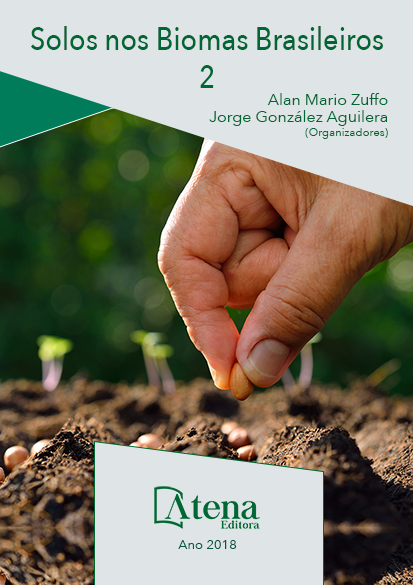
GEOESTATÍSTICA APLICADA AO MAPEAMENTO DA RESISTÊNCIA DO SOLO À PENETRAÇÃO E UMIDADE GRAVIMÉTRICA EM PASTAGEM COM Cynodon spp.
The objective of this study was to map the spatial distribution of soil
resistance to penetration and soil humidity with Cynodon spp. The evaluations were
acco mplished in November 2016, in the mediations of the Federal Rural University of
the Amazon, Campus of Parauapebas, in an experimental plot with intensive grazing
sheep three years ago. The experimental area has slightly wavy relief and dimensions
of 130 x 30 m, where it was sampled and referenced in the GPS in a regular grid of
5 x 5 m, with total of 60 points. At each point, RP and Ug were determined at depths
of 0.0-0.10; 0.10-0.20 and 0.20-0.30 m. The geostatistical modeling of RP and Ug
were performed using the Gs + software, version 7. The maps were generated by the
kriging interpolation method through the Surfer software, version 11. The models that
best fit the semivariograms for pasture were the exponential and spherical, for RP
and Ug, respectively. The attributes studied presented spatial variability with spatial
dependence index (SDI) ranging from moderate (0.25 <SD≤0.75) to strong (SD>0.75).
The sampling grid showed spatial dependence in all analyzed cases. The soil attributes
mapping allowed to verify a critical zone for RP (RP>2.5 MPa) in the depth of 0.20 -
0.30 m, which probably occurred due to the intensive grazing of animals.
GEOESTATÍSTICA APLICADA AO MAPEAMENTO DA RESISTÊNCIA DO SOLO À PENETRAÇÃO E UMIDADE GRAVIMÉTRICA EM PASTAGEM COM Cynodon spp.
-
DOI: 10.22533/at.ed.09418141211
-
Palavras-chave: Variabilidade espacial. Tifton. Compactação.
-
Keywords: Spatial variability. Tifton. Compaction.
-
Abstract:
O objetivo do trabalho foi mapear a
distribuição espacial da RP e Ug do solo com
Cynodon spp. As avaliações foram realizadas
em novembro de 2016, nas mediações da
Universidade Federal Rural da Amazônia,
campus de Parauapebas, em uma parcela
experimental com ovinos em pastejo intensivo
por três anos. A área experimental possui
relevo suave ondulado e dimensões de 130 x
30 m, onde foram amostrados e referenciados
no GPS em grade regular de 5 x 5 m, com total
de 60 pontos. Em cada ponto amostral, foram
determinados a RP e a Ug nas profundidades
de 0,0-0,10; 0,10-0,20 e 0,20-0,30 m. A análise
descritiva foi realizada através dos parâmetros:
média, máximo, mínimo, coeficiente de
variação, assimetria, curtose e avaliação
de normalidade pelo teste de KolmogorovSmirnov. A modelagem geoestatística de RP e
Ug foram realizadas com o auxílio do software Gs+, versão 7. Os mapas foram gerados pelo método de interpolação por krigagem
através do software Surfer, versão 11. Os modelos que melhor se ajustaram aos
semivariogramas para pastagem foram o exponencial e o esférico, para a RP e Ug,
respectivamente. Os atributos estudados apresentaram variabilidade espacial com
índice de dependência espacial (IDE) variando de moderado (0,25<IDE≤0,75) a forte
(IDE>0,75). A malha de amostragem captou a dependência espacial em todos os
casos analisados. O mapeamento dos atributos do solo permitiu verificar uma zona
crítica para a RP (RP>2,5 MPa) na profundidade de 0,20 – 0,30 m, que ocorreu,
provavelmente, devido ao pastejo intensivo de animais.
-
Número de páginas: 15
- Francisca Lala Santos Teixeira


